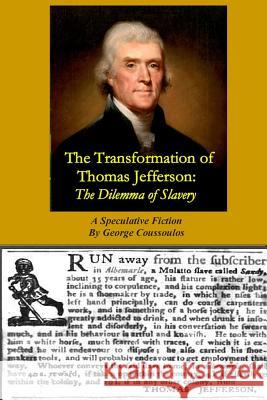The Transformation of Thomas Jefferson: The Dilemma of Slavery » książka
The Transformation of Thomas Jefferson: The Dilemma of Slavery
ISBN-13: 9781499229035 / Angielski / Miękka / 2014 / 480 str.
The Transformation of Thomas Jefferson: The Dilemma of Slavery A Speculative Fiction Thomas Jefferson spoke out against slavery in no uncertain terms. He considered it contrary to the laws of nature that decreed everyone had a right to personal liberty. He called the institution an "abominable crime," an "assemblage of horrors," a "moral depravity," a "hideous blot," and a "fatal stain." Early in his political career Jefferson took actions that he hoped would end in slavery's abolition. In his 1776 draft of Virginia Constitution he wrote "No person hereafter coming into this country shall be held within the same in slavery under any pretext whatever." He further advocated a plan of gradual emancipation, by which all born into slavery after a certain date would be declared free. In 1784 he proposed an ordinance banning slavery in the new territories of the Northwest. This act in itself could have set the precedent for all future territories but it failed to pass in Congress by one single vote. If Jefferson had died in 1785, he would be remembered as an antislavery hero, as one of the first pivotal figures to advocate specific measures for eradicating slavery. After that time, however, Jefferson made no public statements on American slavery nor did he take any significant public action to change the course of his state or his nation - or of his own slavery dependant lifestyle. Countless articles and scores of books have been written trying to explain the inconsistencies between Jefferson's words and actions in regard to slavery. We know that during his 83 years he took no action that altered the institution. Yet one cannot help but wonder - what if? What if the great man had altered the course of his life? What if Thomas Jefferson had become an advocate for the free men and women of color who populated the southern states in the first quarter of the nineteenth century? What if he had first-hand knowledge of the accomplishments and economic successes of scores of free blacks? What if the race of people whose intelligence and ambition he had questioned were shown in successful commercial enterprises in existing free black communities? What if a person he highly respected had influenced Jefferson to become involved with advocacy for these free people of color, and further demonstrated viable plans for eradicating slavery itself? Might the course of history have been changed if the spirit of Jefferson's most famous words, "all men are created equal" had been transformed into sponsorship and action? Could the aura and influence of a transformed Jefferson be persuasive enough to influence the nation's other nineteenth century leaders? Could solutions be found to impact the divergent views and animosities of northern abolitionists and southern apologists? Ultimately, could a path toward the demise of slavery become a reality during Jefferson's lifetime? And could such efforts preclude the inevitability of a cataclysmic civil war? Of course, a story based on these "what ifs" is but speculative fiction. And as a work of fiction what is its intent? Is it a reaction to 21st century critique that lowers the pedestals of founding fathers who are seen as hypocrites for their ownership of slaves? Is there an attempt to gloss over the tragedy and inhumanity of slavery in order to justify monuments made to mere mortals? Or does the fiction create an appreciation for the rhythms and realities of the19th century? If the book is compelling enough to cause the reader pause in considering any of these questions, it will meet its intended purpose.
Zawartość książki może nie spełniać oczekiwań – reklamacje nie obejmują treści, która mogła nie być redakcyjnie ani merytorycznie opracowana.











